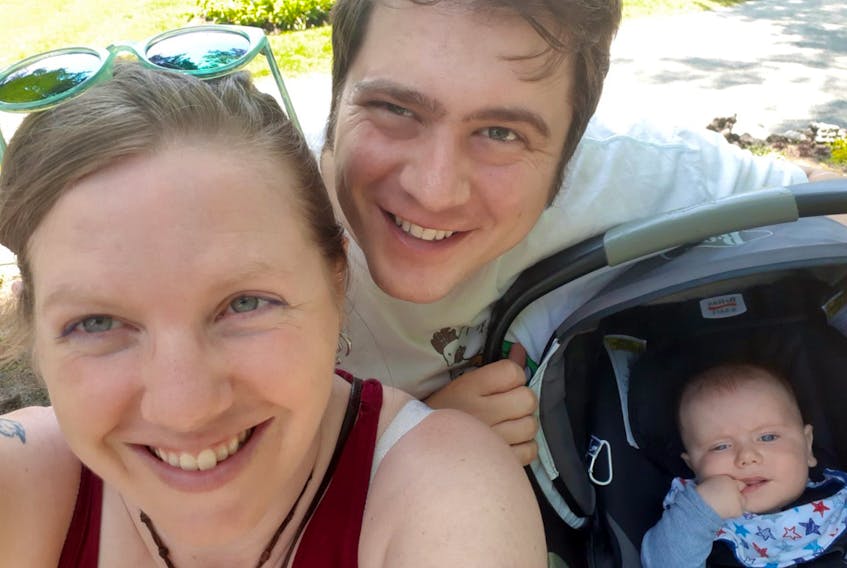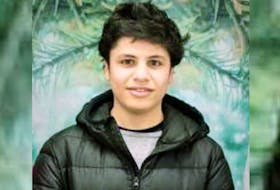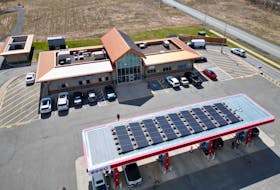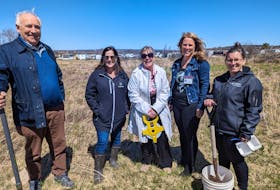A cursory peek into the home life of Thomas and Kacy DeLong would look pretty standard at first glance. The young married couple work on the family farm, and at the end of the day, struggle to wind their 18-month-old son, Tobin David DeLong, down for the night and steal a little bit of time to themselves before bed.
But keep looking, and you might start to notice some things. Thinks like Thomas' shaky hands. Or his careful adherence to his diet. Or that he can just seem so exhausted, from time to time.
But even with those hints, you probably wouldn't know Tom suffers from kidney disease unless he told you. Specifically, he has IgA nephropathy (aka Berger's disease).
“Usually it's a child's disease, where the immune system attacks cells in the kidneys,” Thomas explains by phone, from his and Kacy's home in Bridgewater.
“It goes away by the time you're 18 to 20. I had friends in university who saw the same doctors I did, and that happened to them - they got better. But occasionally, the kidney problems get worse; it amplifies over time.
“When I was 27, I got an infection, and the virus and fever affected my kidney function. A couple years later, I was in renal failure.”
Managing IgA throughout his life meant medications – steroids like prednisone, and immunosuppressants like imuran – and being unable to eat food heavy in salt. But when his kidney function took a precipitous dip, so too did his options on a menu.
“It starts getting more intense when you have to start cutting potassium out of your diet. No potato, no bananas, and leafy greens [like] spinach.” says Thomas. “It's popularly called the Cardboard & Water Diet.”
Kacy adds, “No potatoes, that really killed him, man. You try to mimic potato with cauliflower, but it's a pretty pale comparison.”
Lack of flavour was among the least of his concerns, though. Even as the search began for an organ donor for Thomas, his kidney function seemed to be in a hurry to fail.
“Where he has been diagnosed with kidney disease for quite a while, and where they knew he was going to need a transplant, they had been hoping for a preemptive transplant,” says Kacy, who doubled as Thomas caregiver during this period, cooking dinners he could eat, and eventually, driving him back and forth to Halifax for dialysis.
“He kind of nosedived quick, so he did have to go on dialysis while his donor was getting a work-up.”
His donor was a lifelong friend of Kacy's, David (yes, the same David as the DeLong's son's middle name). He was hellbent on being Thomas' donor, going so far as to give up drinking and smoking, and getting himself in shape so he could be healthy enough to match as a donor.
“It was a wonderful thing that he did for us,” says Kacy.
Since the transplant, Thomas' health has bounced back considerably. He's still on a contingent of meds, each with a few side-effects. And while he still needs to be observant of his diet, Thomas is thrilled to have, well, food on his plate again.
“Everything tastes like . . . it's like the colour's back in food,” Thomas reminisces, as Kacy reminds him how great it was for him to enjoy ketchup-flavour chips again. “I really missed it.”
An invisible illness
The DeLong's story definitely puts a face to kidney disease – or at least one facet of it. According to Michelle MacMullin – Nova Scotia development coordinator for the Kidney Foundation of Canada, Atlantic Branch – it's the kind of illness that could use more faces out there attached to it.
“The reality is, if you look around your neighbourhood, chances are - three houses have 10 people - one of those people is affected by kidney disease,” she explains. “Kidney disease isn't as much of an in-your-face; you could look at somebody and not have a clue.”
The DeLongs were fortunate, as they put it, to have a great support network through their family on the farm. But a lot of the DeLong's friends, neighbours and community acquaintances only learned about Thomas' diagnosis when the couple hosted Bridgewater's first Kidney Walk Atlantic event last year. And even more surprising, the DeLong's learned about the ways kidney disease has touched those same people.
“A lot of people we knew came out – including donor Dave – and a lot of people that I didn't know had even heard of it,” says Kacy. “There's a lot of people you don't know are touched by this disease.”
The reality is, with 1-in-10 Canadians living with kidney disease, you probably know someone with it, or someone who's impacted by someone with it. Anyone, from the check-out clerk you see at the grocery store each week, to your local government representative, to – yes – the author of this article, could be living with kidney disease, and you might never know.
Kidney Walk
That's where the Kidney Walk comes in. The goal is to get the community out together for a common goal, and to bring kidney disease out from behind closed doors, so everyone can see just how much of an impact it has on just about all of us.
“What something like a walk does…is it really puts a personal story out there; it puts a face to the disease,” says MacMullin, who's coordinating 18 walks across Atlantic Canada throughout September. Each local walk is organized – by design – by the regional volunteers, so that the members of the community can be their own spokespeople.
“Each walk, we try to celebrate the community that it's in, and the individuals in the community who are supporting or living with kidney disease.”
Last year, the DeLongs were the honorary chairs of the walk. This year, the honour goes to Charles Ley Sr.
“We're looking forward to that, not being quite so centre-stage this year,” says Kacy. She adds, beaming with pride, “I think we raised as much as Sydney in our first year.”
If you're interested, you can register either with a paper pledge sheet, or you can register online at www.kidneywalk.ca. Online registration generates a unique URL, which can be shared on social media, so potential donors can donate in your name directly.
On top of fundraising – which supports both kidney research, as well as Camp Lot-a-Wata at Brigadoon Village – awareness is the major goal of the walk, especially with regards to organ donor-ship.
“Become an organ donor,” says Kacy. “That's our big message through all of this. Make sure you have this conversation with your family.”
Thomas' story may sound like a happy ending, but it's not an ending. It's just the current chapter.
“One thing that I find I live under the weight of is knowing that Thomas is going to need another
transplant,” says Kacy, who explains that most live donor transplants have a 20-year life expectancy.
“It's a treatment; not a cure,” adds Thomas.
But events like the Kidney Walk help remind the DeLongs that they're not in this alone – they have a whole community to lean on.
“Don't be shy to reach out for help – there's no point in suffering in silence,” says Kacy. “Tell people what you need, and more often than not, they'll give you more than you expect.”
This year's Kidney Walk in Bridgewater happens on September 22.









